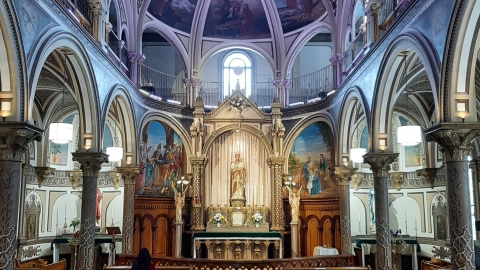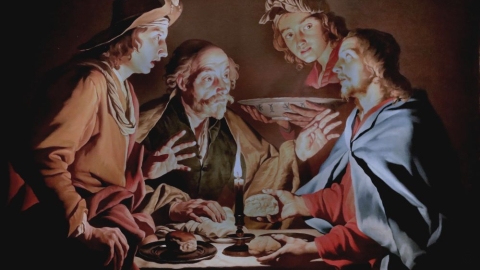When Ecology Supplants Theology

The “World Day of Prayer for the Care of Creation” was launched by Pope Francis in 2015 in the spirit of Laudato si’ (May 24, 2015), his “environmental” encyclical, as the press describes it.
This year, the Day for the Care of Creation inaugurates the “Time of Creation,” a month-long period from September 1 to October 4, and dedicated to the “Jubilee for the Earth.”
In the message that the Pope published on September 1, states—among other things—that we must “restore the original harmony of creation and…heal strained human relationships,” demand “restorative justice” from the Northern countries towards the Southern countries, because—in Francis’ eyes—the rich countries contracted “
created an enormous ecological debt, due mainly to resource plundering and excessive use of common environmental space for waste disposal.”
In preparation for the Glasgow, Scotland, climate summit, postponed to 2021 due to the pandemic, each country is invited by the Pope “to adopt more ambitious national targets to reduce emissions.” For Francis, it is a question of restoring the climatic balance and of uniting in order to limit the increase in the average temperature to the threshold of 1.5° C, the objective set by the Paris Climate Agreement (COP21) on climate change.
According to the Pope, another major stake is the preservation of biodiversity, to safeguard 30% of the Earth as a protected habitat before 2030. According to him, the 15th meeting of the UN Convention on Biological Diversity, in Kunming, China—also postponed to 2021—must constitute a real “turning point” so that the Earth once again becomes a home where life is “abundant.”
The fifth anniversary of Laudato si’ is a cause for celebration, according to Francis, because it sees a coming together of communities of believers “to create a more just, peaceful, and sustainable world” in an ecumenical spirit. According to him, the Holy Spirit animates many individuals to rebuild the common home and defend the most vulnerable: “We see the gradual emergence of a great mobilization of people from below and from the peripheries who are generously working for the protection of the land and of the poor.”
On October 3, at the end of the Time of Creation, the Pope will go to Assisi to sign the third encyclical of his pontificate, entitled “Fratelli tutti” (Brothers All). DICI will not fail to analyze this document as soon as it appears, but it is clear that Francis’s message for the World Day of Prayer for the Care of Creation has already aroused many and lively reactions.
Thus Riccardo Cascioli, in La Nuova Bussola Quotidiana of September 3, affirms that this message from the Pope appears to be a “Christian manifesto of happy degrowth, seasoned with the usual pattern of the rich against the poor, of the North against the South,” and that “the reference to the Creator God appears as an ideal and fleeting reminder, isolated and disconnected from all the subjects dealt with, which have more to do with WWF [World Wildlife Fund/ World Wide Fund for Nature] campaigns or paleo-Marxist schemes.”
And to denounce this “tendency to push through into the ranks of the magisterium scientific theses and political analysis, which by nature are provisional and questionable. In other words, on the one hand, they ignore true doctrine, the questions of faith and morals which are part of the patrimonium fidei of the Church and constitute the truth about man, about God, and about reality; on the other hand, they elevate to the rank of doctrine those which may at best be possible consequences of a Christian view of reality, but which are much more often the fruit of the mentality of this world. This is a very thorny question because the Church thus ceases to proclaim eternal truths and launches headlong into contingent political debates, creating greater divisions and confusion, while she thinks she is contributing to the unity of mankind.”
R. Cascioli aptly recalls the source from which Francis’s message draws when he invites each man “to be part of a whole, of a ‘living community,’ as defined by the Earth Charter, echoes of which can be found both in Laudato si’ and in the message for Creation Day.” It should be known, he writes, that this “Earth Charter is a document approved in 2000 by UNESCO, which brings together the fundamental ethical principles which had inspired the United Nations international conferences on the environment and development, and which are the basis of current global policies, in which it is the activity and presence of man himself that constitutes a problem for ecosystems.”
On September 1, on her blog, Jeanne Smits perfectly expressed this “feeling of embarrassment at reading this message [from the Pope] which certainly evokes the fact that ‘we have broken the links which united us to the Creator, to other human beings. and the rest of creation,’ but which in no way evokes the cause of this rupture, namely original sin which wounded human nature and unbalanced nature itself, rendering man radically incapable of knowing friendship with the Holy Trinity without first being redeemed from Adam’s fault and his own faults.”
The French journalist rightly underlines: “in thinking about it, it appears rather like the reestablishment of an earthly paradise, and this by means of taking into account the needs of the earth, which would not go through a prior personal conversion to God, with the help of His grace, but by an ideal of universal ‘sharing,’ the implementation of which tends to lead to bloodshed.”
A Millennial and Pelagian Utopia
Therefore, the next encyclical “Fratelli tutti” (Brothers All) can only be a cause for worry, as shown by FSSPX. News of September 9: “Unfortunately, it is feared that the defects found in both the Laudato si’ encyclical and in the Document on Human Fraternity [co-signed on February 4, 2019, in Abu Dhabi, by Francis and the Grand Imam of Al-Azhar] will be put forward again, and that the serious reservations which have been raised against them would not be re-stated.”
“Since Laudato si’, papal thought has not come out of a millenarian, Pelagian utopia.
“Millennialist, because it dreams of an impossible restoration of nature wounded by original sin. Doesn’t the Pope’s last message, of September 1, say that ‘the Jubilee is a time to repair the original harmony of creation’?
“Pelagian, because the ‘conversion’ that leads to this restoration is conceived without God’s help. How to consider—for all the inhabitants of the globe to whom this encyclical is addressed—a ‘civilization of love,’ a ‘universal brotherhood,’ or a ‘new synthesis,’ without grace?”
“It means ultimately forgetting the universal Kingship of Christ, alone capable of restoring the wounded man, of giving him divine charity for himself and in his dealings with others, and preserving in him care for the respect of creation.”
(Sources : Vatican News/NBQ/J.Smits/FSSPX actualités – DICI n°400, septembre 2020)
Illustration : Kadoka1 / CC BY-SA (https://creativecommons.org/licenses/by-sa/3.0)



